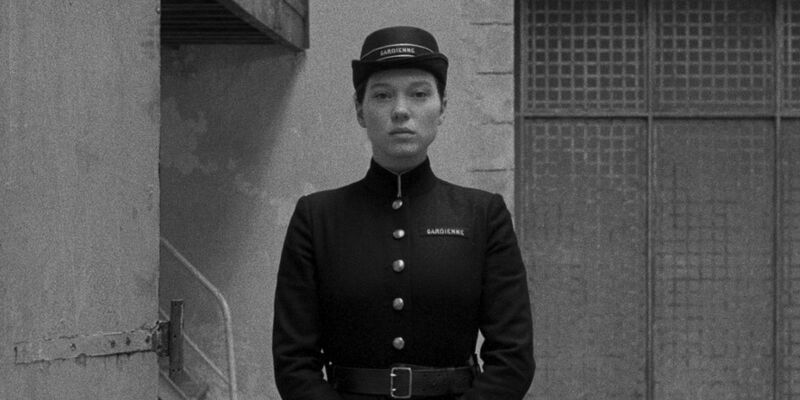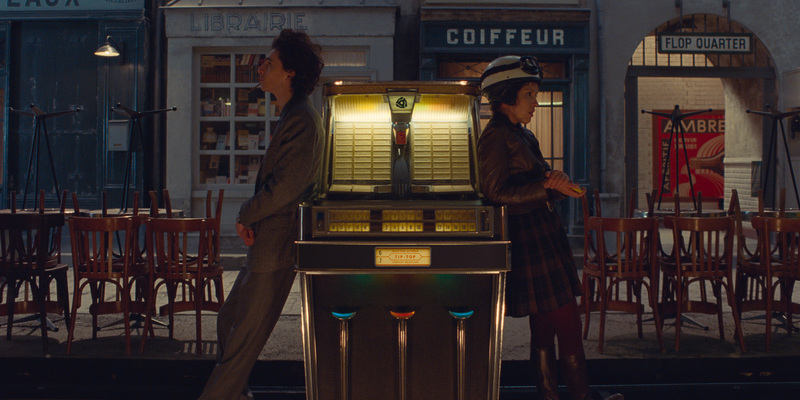
Review by Eric Hillis
Directed by: Wes Anderson
Starring: Bill Murray, Benicio del Toro, Frances McDormand, Jeffrey Wright, Adrien
Brody, Tilda Swinton, Timothée Chalamet, Elisabeth Moss, Léa Seydoux, Owen
Wilson, Mathieu Amalric, Lyna Khoudri, Stephen Park

The French Dispatch is unmistakably a
Wes Anderson movie. It boasts sumptuous production and costume
design, exquisite framing, a staggering ensemble cast and a yearning for a
lost era that probably only exists in the minds of those born too late to
have actually experienced it. Whether or not this is a good thing will
depend on how highly you regard Anderson's work. Personally, I struggle with
most of his films, though I always admire them. He's one of the few working
American filmmakers who displays an obsession with visual details, and his
films are always a pleasure to look at, if perhaps difficult to engage
with.
That's once again the case here. For my money, Anderson's best work is
The Grand Budapest Hotel, which saw him marry his distinctive visual style with a story that was
consistently witty and engaging. The French Dispatch is a lot
like the b-side of The Grand Budapest Hotel. It shares that film's nostalgia for central Europe in the mid 20th
century, or at least a fiftysomething Texan man's idea of such, and is split
into several ditties featuring more characters than a Tolstoy novel.

The movie's best portion comes right at the beginning as we're introduced
to the titular journal, a Sunday supplement delivered to the readers of a
fictional Kansas City newspaper. The film opens with an obituary for the
magazine's editor, Arthur Howitzer Jr. (Bill Murray), one of
those mythical old editors who gave their writers an improbable amount of
leeway. We're then introduced to Ennui - the fictional French city where the
offices of the Dispatch are located - by way of a travel guide penned by
Dispatch staffer Herbsaint Sazerac (Owen Wilson).
All this takes place over about 15 minutes, but Anderson does a wonderful
job of establishing his film's setting. It's a shame then that the three
longer stories that follow do little to exploit such a wonderful
backdrop.
The first story - The Concrete Masterpiece - takes place mostly within the
walls of Ennui's local insane asylum, where artist Moses Rosenthaler
(played as a young man by Tony Revolori and an adult by
Benicio del Toro) is incarcerated for murder. Enlisting a female
prison guard (Lea Seydoux) as his muse, Rosenthaler creates artworks
that catch the eye of fellow inmate Julien Cadazio (Adrien Brody), an
art dealer who purchases one of his works. When Cadazio is released he
introduces the art world to the still imprisoned Rosenthaler, who becomes an
instant sensation.

The Concrete Masterpiece is the most energetic and satisfying of the three
stories that make up the bulk of The French Dispatch. But it relies a little too heavily on outdated mockery of the art scene.
Movies like Roger Corman's A Bucket of Blood and the Tony
Hancock vehicle The Rebel were doing this sort of thing six
decades ago. There is an amusing commentary on the idea of separating the
art from the artist, with Cadazio appealing for Rosenthaler's release due to
his artistic talents - "Surely there should be a double standard for this
sort of thing?" he asks the prison board. Amid the somewhat stale plotline
there are some inventive sight gags that nod to silent era comedy.
The second, and weakest, of the three stories is Revisions to a Menifesto.
Again we get a somewhat tired pastiche, this time of college politics.
Frances McDormand plays Lucinda Krementz, a veteran journalist
covering Ennui's student revolution. In doing so she begins an affair with
pretentious, mustachioed student leader Zeffirelli (Timothée Chalamet, in a role he was born to play). Zeffirelli is also dating
Lyna Khoudri's Juliette (geddit? Ugh), the head of the college's
feminist faction. This segment is laboured to the point of exhaustion,
making the same old jokes about young people with naive politics that
fuelled several seasons of the '70s British sitcom
Citizen Smith. It amounts to a middle-aged liberal telling progressive youngsters to get
over themselves.
Things improve somewhat with closing segment The Private Dining Room
of the Police Commissioner. Jeffrey Wright is outstanding as Roebuck
Wright, the Dispatch's James Baldwin stand-in. He narrates the tale from the
stage of a Dick Cavett-esque talk show, a reminder of a time when guests
were invited onto such shows not because they had something to sell but
because they had something to say.

The tale itself is something of a
rambling mess, revolving around the kidnapping of the young son (Winston Ait Hellal) of the town's police commissaire (Mathieu Amalric). It all leads
to an elaborate chase that is rendered in 2D animation, which feels like
something of a copout, like that joke in Spice World where the
Spice Girls' tour bus is replaced by an obvious model as it jumps over a
bridge.
It feels churlish to be so down on a movie that is so lovingly crafted, but
for all its visual splendour (and I can't stress enough how visually
splendid this film is), The French Dispatch rarely reels you
in emotionally. For a movie that's a tribute to a lost age of
intellectualism, it sure is filled with the sort of lowbrow jokes that
wouldn't be out of place in an episode of 'Allo 'Allo. Much of the humour relies on the idea that artists, intellectuals and
France itself are inherently amusing, which makes you wonder what sort of an
audience Anderson had in mind. With The French Dispatch, Anderson appears to be mocking the sort of people who keep him in work
while veering dangerously close to self-parody.

The French Dispatch is on Disney+ UK/ROI
now.
